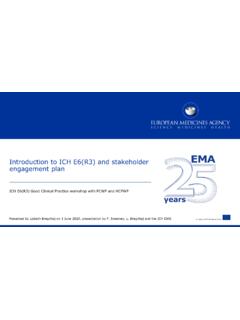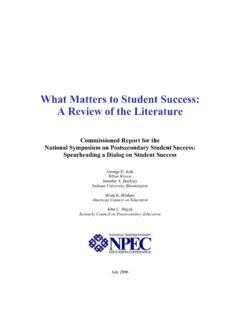Transcription of Academic Engagement: An Overview of Its Definitions ...
1 International Education Studies; Vol. 9, No. 12; 2016 ISSN 1913-9020 E-ISSN 1913-9039 Published by Canadian Center of Science and Education 41 Academic engagement : An Overview of Its Definitions , Dimensions, and Major Conceptualisations Oqab Alrashidi1, Huy P. Phan1 & Bing H. Ngu1 1 School of Education, University of New England, Armidale, NSW, Australia Correspondence: Oqab Alrashidi, School of Education, University of New England, Armidale, NSW, Australia. Tel: 61-267-733-949. E-mail: Received: May 26, 2016 Accepted: June 30, 2016 Online Published: November 24, 2016 URL: Abstract engagement is a prominent theoretical orientation that has received great attention from educators and researchers. This article provides a literature Overview of the engagement construct pertaining to its various Definitions , dimensions, and major conceptualisations.
2 In addition, the review sheds light on two major approaches to engagement in the current literature: one entails students cognitive, behavioural, and emotional engagement (Fredricks, Blumenfeld, & Paris, 2004), and the other approach is characterised by vigor, dedication, and absorption (Schaufeli, Salanova, Gonzalez-Rom, & Bakker, 2002). Further, the association between these two models and students performance is discussed. Keywords: Academic engagement , Definitions of Academic engagement , dimensions of Academic engagement , conceptualisations of Academic engagement 1. Introduction Over the last seven decades, researchers and educators have exhibited a growing interest in the concept of engagement as a way to improve disaffection, to avert student boredom, to enhance students motivation and involvement in school-related activities, to increase successful student achievement levels, and to understand students positive development (Appleton, Christenson, & Furlong, 2008; Carter, Reschly, Lovelace, Appleton, & Thompson, 2012; Fredricks et al.)
3 , 2004; Li & Lerner, 2011; National Research Council & Institute of Medicine, 2004; Upadyaya & Salmela-Aro, 2013). engagement is also a valuable construct for capturing the gradual process by which students drop out from school (Appleton et al., 2008; Appleton, Christenson, Kim, & Reschly, 2006; Finn, 1989). Given that students dropping out from school is not an instantaneous event, but rather a gradual process that happens over time, researchers and educators alike view engagement as the main theoretical model for intervening with and understanding potential dropouts to enhance positive performance and encourage school completion (Appleton et al., 2008; Appleton et al., 2006). 2. What Is engagement ? engagement is a complex term that emphasises students various patterns in motivation, cognition, and behaviour (Appleton et al.
4 , 2008; Baron & Corbin, 2012; Fredricks et al., 2004; Phan & Ngu, 2014a; Sharma & Bhaumik, 2013). Researchers have investigated the construct extensively in the last seven decades, and the literature generally reflects substantial variations in its terms, Definitions , and coverage (Appleton et al., 2008; Baron & Corbin, 2012; Fredricks et al., 2004; Klem & Connell, 2004; Sharma & Bhaumik, 2013; Upadyaya & Salmela-Aro, 2013). Different researchers have offered various terms and coverage of engagement such as school engagement ( , Fredricks et al., 2004), study engagement ( , Schaufeli et al., 2002), and student course engagement ( , Handelsman, Briggs, Sullivan, & Towler, 2005). Examples of these variations and their corresponding Definitions offered by scholars in the literature are provided in Table 1.
5 International Education Studies Vol. 9, No. 12; 2016 42 Table 1. Examples of variations in terms and Definitions of engagement Authors Construct Name Definition Audas & Willms (2002) engagement The extent to which a student participates in Academic - and non- Academic -related activities as well as identifies with and values the goals of studying. Skinner, Kindermann, & Furrer (2009) engagement The quality of students participation or connection with the schooling endeavour and hence with activities, values, people, goals, and place that comprise it.
6 Skinner, Wellborn, & Connell (1990) engagement A student s initiation of effort, action, and persistence in schoolwork as well as his ambient emotional states during learning activities. Willms (2003) Student engagement at School The extent to which a student values school-related outcomes and identifies with and participates in Academic and non- Academic school activities. Newmann, Wehlage, & Lamborn (1992) Student engagement in Academic Work Students psychological effort and investment toward learning, understanding, or mastering the skills, crafts, or knowledge that the schoolwork is intended to promote. Wehlage, Rutter, Smith, Lesko, & Fernandez (1989) Educational engagement The psychological investment needed to master and understand skills and knowledge explicitly taught in educational institutions.
7 Kuh (2003) Student EngagementThe energy and time a student devotes to educational sound activities outside and inside classrooms, and practices and policies that educational institutions use to encourage the student to participate in these activities. Schaufeli, Salanova, Gonzalez-Rom, & Bakker (2002)Study engagement A fulfilling and positive study-related state of mind that is characterised by absorption, vigor, and dedication. Christenson, Reschly, Appleton, Berman-Young, Spanjers & Varro (2008) Student EngagementStudents investment in and commitment to learning, belonging and identification at school, and participation in the institution environment and initiation of activities to achieve an outcome. Table 1 shows, as mentioned earlier, some examples of a plethora of engagement terms and Definitions .
8 Despite their variations, some similar themes have been noted between the Definitions across the researchers. For example, the Definitions proposed by Audas and Willms (2002), Skinner et al. (2009), Skinner et al. (1990), and Willms (2003) emphasised students participation and identification with school and school-related activities. The Definitions by Newmann et al. (1992) and Wehlage et al. (1989) drew a link between engagement and students psychological investment in learning. While Kuh s (2003) definition of the concept focused upon the link between engagement and energy, Schaufeli et al. (2002) emphasised students motivational mindset related to their study activities that is characterised by dedication, vigor, and absorption.
9 Christenson et al. (2008), in turn, have outlined a general definition of the notion, involving aspects mentioned in the earlier Definitions and emphasising students participation, commitment, investment, and identification with schooling and school-related activities. Finally, while a myriad of terms and Definitions have been proffered, engagement is broadly a positive and proactive term that captures students quality of participation, investment, commitment, and identification with school and school-related activities to enhance students performance. 3. Dimensions of engagement Although engagement is relatively diverse in its Definitions and coverage, researchers have reached a consensus that the construct is multidimensional and encompasses different aspects ( , behavioural, cognitive, and emotional), operating together to reflect students positive approach to learning (Appleton et al.)
10 , 2008; Carter et al., 2012; Fredricks et al., 2004; Phan, 2014b; Schaufeli et al., 2002; Upadyaya & Salmela-Aro, 2013). However, researchers have consistently disagreed on the types and number of the dimensions of engagement (Appleton et al., 2008; Fredricks et al., 2004; Li & Lerner, 2011; Schaufeli et al., 2002). For example, the work of Schaufeli et al. (2002) conceptualised engagement as having three dimensions ( , vigor, dedication, and absorption), as opposed to Willms (2003) who identified two components of the construct ( , behavioural and psychological). Table 2 presents some examples of the variations in number and types of dimensions that researchers have proposed in their models for the construct. International Education Studies Vol.

















